Al-Zaytouna Centre for Studies and Consultations held on Thursday 16/1/2014 a one-day seminar entitled “The Issue of Palestine: Strategic Evaluation 2013 – Strategic Assessment 2014,” in Ramada Plaza Hotel in Beirut. The seminar evaluated the developments of the Palestinian issue throughout 2013, and tried to explore its possible trends in 2014.
The seminar comprised three sessions and brought together a select of specialists and those interested in the Palestinian issue who discussed the Palestinian internal situation, the Arab-Israeli issue, and the external environment affecting the Palestinian issue.
Worth of mention is that the seminar is the seventh in a series of sessions of strategic evaluation and assessment of the developments of the Palestinian issue held by Al-Zaytouna Centre at the beginning of every year.
Opening and First Session
In the opening remarks, Prof. Dr. Mohsen Mohammad Saleh, al-Zaytouna’s General Manager, welcomed the participants and presented the main points and issues the seminar would address.
The first session was moderated by Palestinian media person Nafeth Abu Hasna, and it tackled the Palestinian issue. Speakers is this session were Dr. Hussein Abu el-Naml, the Palestinian researcher, Hani al-Masri, the Head of the Palestinian Centre for Policy Research and Strategic Studies (Masarat), and Usama Hamdan, the head of Hamas International Relations Department.
Discussing the developments of the Palestinian reconciliation and the probable trends, Dr. Abu el-Naml said that 2013 was the year of Arab strategic failure due to the witnessed transformations that would have a strategic influence in 2014.
Abu el-Naml said that the crisis of the Palestinian division, which is being solved with reconciliation, is but a symptom of a malady represented in the crises of the Palestinian national project and the Palestinian political identity. This identity suffers imbalance on different levels, including the divisions of the Palestinian factions.
He added that the absence of an apt Palestinian political system means that whatever takes place under the title of reconciliation is only a temporary measure taken by the factions; based on the reproduction of the quota system and balance of forces. He also pointed out to the fact that the disruption of reconciliation for seven years means that there is an external decision overwhelming the two sides and preventing the implementation of the points already agreed on by Fatah and Hamas. In other words, terminating the Palestinian division is not allowed, Abu el-Naml said.
For his part, al-Masri talked about the developments of the peace process and its possible trends. He said that the past year talks between the Palestinian Authority (PA) and Israel would influence the possible trends in 2014. He added that the resumption of negotiations was based on Israeli rather than Palestinian conditions, and talking about any guarantees in this context is groundless.
Al-Masri also said that Secretary of State John Kerry was keen in his recent visits to involve the Arabs, especially Jordan, in the negotiations. He was also keen to proceed with the political and economic tracks, attaching the economy carrot to the political track.
Usama Hamdan tackled the developments of the Palestinian resistance and the possible tracks. He asserted that the most dangerous aspect of the radical changes in the region now is the incitement against the resistance, where the latter was a source of pride for the nation.
Hamdan added that Israel is now in a state of ecstasy as Syria is being destroyed and Egypt is collapsing from within. He talked about the need to restore the role of Palestinians in Diaspora in two ways; Reviving the right of return and the issue of refugees, and re-activating the role of Palestinian Diaspora in the resistance against Israel. Hamdan attested that in light of the transformations in the region, the Palestinians must maintain in balance so the Palestinian issue continues to be among regional priorities and in order to guarantee the support for the Palestinian national project.
Second Session
The second session was moderated by Lebanese MP Imad al-Hout, and it tackled the Arab-Israeli issue. Papers were presented by Hisham Ya‘coub, Head of Information Department at Al-Quds International Institution, on behalf of Dr. Abdullah al-Ash‘al, former Egyptian deputy foreign minister, Jawad al-Hamad, Manager of the Middle East Studies Center and Hilmi Musa, Israeli affairs editor of Assafir daily.
Dr. al-Ash‘al addressed Egypt and the Palestinian issue and the possible trends. He said that the Egyptian stance towards the Palestinian issue is one of the major determinants of latter’s status since its inception in 1948. He asserted that the Egyptian issue, the Iranian stance and its prospects, and the future of the Syrian crisis are three factors that form the basis of the external equation, since they are interconnected with the two sides of the Palestinian political scene, and with Israel.
Al-Ash‘al asserted that the strategic relation between Egypt and Palestine makes the regime and the power conflict in Cairo a decisive factor in determining the future trends in Palestine. If the current regime in Egypt succeeds and the defense minister takes over power, this would mean escalation in tension with Hamas, especially if the army proceeded with fighting the Sinai terrorism. It would also mean more cooperation with Israel and more freedom for Hamas’s enemies in Egypt.
Jawad al-Hamad presented a paper on the Arab world and the Palestinian issue and the prospect for developments and trends. He said that the Palestinian issue has faced sensitive conditions and developments following the Arab uprisings that urged regime change and termination of tyranny.
He added that there are signs of change regarding the Palestinian issue where Israel is witnessing strategic deterioration despite Egypt’s relative commitment to the peace treaty with Israel. He explained that the resistance in the Gaza Strip has been able to rebuild its capacities and develop its readiness but it is still restrained, while in the West Bank it is achieving gradual recovery.
In his paper about Israel and the Palestinian issue and the probable developments and trends, Hilmi. Musa said that Israeli PM Benjamin Netanyahu has put all the results of previous negotiations aside. He added that the Jewish Home party, which is part of the governmental coalition, threatens that the mere talk about Jerusalem is enough to topple this government. Musa expected that if an interim agreement were reached between the Israelis and the Palestinians, Netanyahu would not be a part of Likud anymore. Fearing this scenario, Netanyahu is ready to show a certain level of flexibility while refusing to discuss any solution mentioning Jerusalem.
Third Session
The third session was moderated by Dr. Majdi Hammad, Chairman of Board of Trustees of the Lebanese International University in Beirut, and it addressed the external environment affecting the Palestinian issue. Speakers during this session included Dr. Najib Noureddine, Director of Contemporary Islamic Thought Foundation for Studies and Research, Muhammad Zahid Gül, Turkish researcher and writer, and Munir Shafiq, former Director of Planning Department in the Palestine Liberation Organization (PLO).
In his paper on Iran and the Palestinian issue, Dr. Noureddine said that Palestine has always maintained a central position in Iran’s foreign policy, stressing that the Palestinian issue is a one of Iran’s funamentals. Noureddine contended that Iran has never succumbed to any pressures trying to force it to give up on, or at least mitigate its stance towards the Palestinian issue. He said that Iran considers the Palestinian issue as the central concern of the Muslim nation, and whose sanctity has urged Iran to adopt it as part of its political creed in its approach to the different world and regional issues.
Noureddine expected that the Iranian-Palestinian relations, especially on the resistance level, would remain susceptible to fluctuation imposed by the critical Arab situation, and they are not likely to restore their previous shape soon. The renewal of trust between Iran and Hamas in particular would need a recuperation period, especially that the final status of Arab uprisings has not crystallized yet to pave the way for stable relations between the two.
For his part, Gül talked about the relation between Turkey and the Palestinian issue and the possible future trends and developments. He asserted that the Turkish popular and official events in support of the Palestinian issue have increased significantly following the Arab spring, thus stressing Turkish affection for the Palestinian issue.
Gül declared that there is a status quo in the Turkish-Israeli relations since the attack on Mavi Marmara, despite the meetings between the two sides and the compensations paid for the families of those killed. He emphasized that no official Turkish condolences were offered after the death of Ariel Sharon saying that commercial relations are still intact especially with the private sector whereas political, military and intelligence relations are severed.
As for Munir Shafiq, he addressed the international impact on the Palestinian issue, especially the US, and the possible tracks. He said that American policy has been characterized by confusion and contradiction in its stances towards Syria and Egypt but not towards the Palestinian issue in 2013. He added that the Palestinian issue has gained more momentum on the international arena in the last three years.
Shafiq affirmed that if a Palestinian uprising breaks out, the US and Israel would not be able to face it, and Israel would even have to dismantle the settlements and withdraw within a few months. Shafiq alleged that the negotiations held under American sponsorship entailed Palestinian concessions represented in dropping the condition of halting settlement construction.
Concluding Remarks
At the end of the seminar, Dr. Saleh thanked the participants hoping that the course of discussion would contribute to enriching and serving the Palestinian issue and those working on it.
Dr. Saleh pointed out to the crises of track, national project, leadership, and trust which are weakening the Palestinian issue. He asserted that we are living now in a historic stage where the whole region is being reshaped. He stressed the need for awareness and for everyone to bear his/her responsibility and work towards establishing a genuine Palestinian national project.
Dr. Saleh summed up stressing that the Palestinians, especially in al-Yarmouk camp and in Gaza, should not pay prices for regional conditions. He stressed that the Palestinians should be distanced from any conflicts and respected as human beings who have faced different crises patiently.



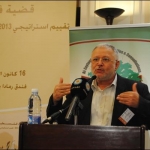
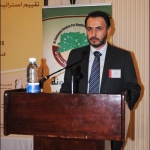
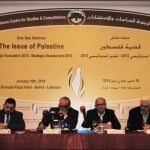
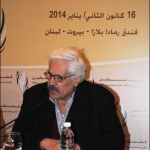
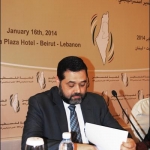
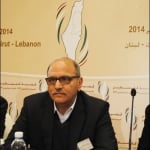
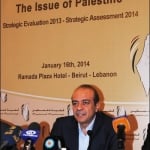
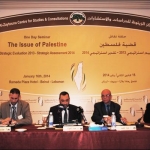
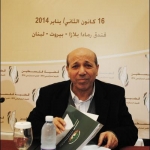
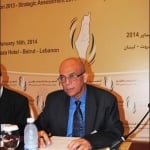
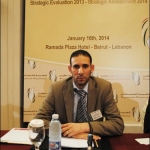
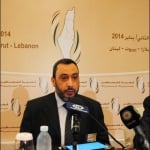
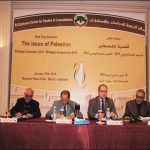
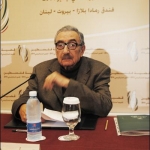
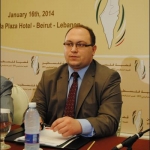
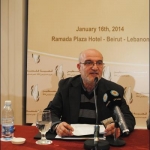
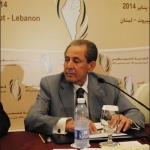
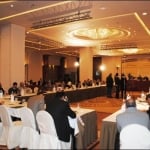

Leave A Comment